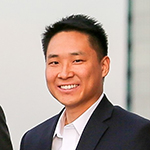Carbon Capture and Ice Cream
Chris Wu’s MSES experience allowed him to pivot his career into sustainable energy with the US Department of Energy’s Office of Clean Energy Demonstrations. The cherry on top? He is helping to make ice cream production more environmentally friendly along the way.
Chris Wu (MSES ‘23) — a techno-economic analyst in the US Department of Energy’s (DOE) Office of Clean Energy Demonstration (OCED) — is part of a team responsible for federal funding of projects that promote a more sustainable environment.
He is also helping to reduce the carbon footprint caused by ice cream lovers.
 Wu is a recent graduate of Northwestern's Master of Science in Energy and Sustainability (MSES) program. MSES is jointly offered by Northwestern Engineering and the Paula M. Trienens Institute for Sustainability and Energy.
Wu is a recent graduate of Northwestern's Master of Science in Energy and Sustainability (MSES) program. MSES is jointly offered by Northwestern Engineering and the Paula M. Trienens Institute for Sustainability and Energy.
Put simply, his job is to determine if the costs and benefits of a new project or technology fits into the marketplace and makes economic sense. This techno-economic analysis is a critical component to evaluate awarding billions of dollars in federal funding across critical energy technologies like regional clean hydrogen hubs or advanced nuclear reactors. But that’s not what Wu leads with when he tells those unfamiliar with his industry what he does for a living.
“The decarbonization of ice cream manufacturing is always a crowd favorite,” he said.
In that project, the DOE selected Unilever – owner of brands such as Ben & Jerry’s, Breyers, and Magnum – for up to $20.9 million for work that would lower the carbon footprint at some of its ice cream facilities. To do that, Unilever plans to replace natural gas boilers with electric boilers and industrial heat pumps using waste heat recovery. The delicious impact of the funding? A proposed 14,000 metric tons of carbon emissions annually, or the equivalent of offsetting the emissions associated with an average gasoline-powered passenger vehicle driving approximately 36 million miles.
The project provides a relatable example of the DOE’s role in promoting environmental sustainability at a corporate level, especially in the industrial sector, which has traditionally been thought of as hard-to-abate, Wu said. It also showcases how the MSES program prepared him for post-graduation success.
“The most impactful lesson I learned in MSES was deep-diving into the framework of the pillars critical to any sustainability or decarbonization endeavor – technology, economics, and regulation and public policy,” he said. “The DOE and OCED are literally serving as part of that third pillar.”
Wu credited numerous MSES courses with providing the foundation for his early success with the DOE.
Classes such as Hydrogen in the Energy Transition and Carbon Removal, Capture, and Use gave him insight into emerging decarbonization technologies. The program’s History and Politics of Resource Innovation and Government Incentives courses provided him with advanced knowledge about government's role in sustainability efforts.
Fundamentals of Natural Resources Distribution and Understanding Global Energy and Sustainability Markets deepened Wu's knowledge of regional and global energy markets.
The program’s project practicum — a 10-week capstone consulting project — tied everything together, he said.
“The project practicum and associated courses were a fantastic experience and opportunity to work on a real-world problem while still engaged in an academic environment,” he said. “The practicum allowed us to apply everything we learned through the program and the three pillars by working with a live client problem.”
Wu worked in the natural gas industry prior to his time in MSES. Looking back on his experience in the program, he found exactly what he wanted in a master's degree.
“I loved the combination of the up-to-date and highly relevant curriculum, prestigious faculty, and the multi-disciplinary approach to sustainability, with a focus in particular on energy,” he said. “Since I already worked in the energy sector, I wanted a program that could build on my existing experience and knowledge but allowed me to pivot toward the path of sustainability.”
That pivot is complete.
“I get to help deploy an array of first-of-a-kind demonstration projects at commercial scale,” Wu said. “They catalyze the commercial liftoff of emerging technologies that have the potential to drive massive decarbonization of the power, industrial, and transportation sectors. My decision to join the DOE was heavily influenced by the ability to make an outsized impact in accelerating the equitable transition to a decarbonized system."